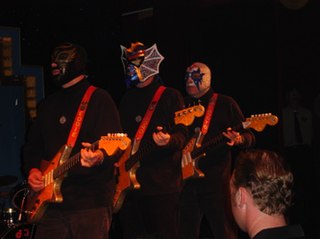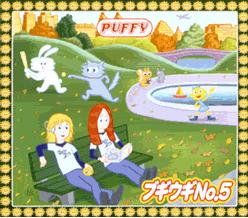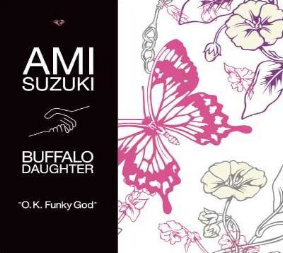
Los Straitjackets is an American instrumental rock band that formed in Nashville, Tennessee, United States, in 1988. Originally comprising guitarists Danny Amis, Eddie Angel and drummer L. J. "Jimmy" Lester under the name The Straitjackets, the band split up soon after forming, but reunited as Los Straitjackets in 1994 with the addition of bassist E. Scott Esbeck. Esbeck left the band in 1998 and was replaced by Pete Curry. The current lineup also features Greg Townson on guitar and Chris Sprague on drums.

Ami Suzuki is a Japanese recording artist, DJ, and actress from Zama, Kanagawa, Japan. Having been discovered at the talent TV show Asayan, she was one of the most popular female teen idol in the late 1990s. However, in 2000, Suzuki faced legal problems with her management company resulting in a controversial blacklisting from the entertainment industry. Suzuki attempted to resurrect her career under her own steam with two indie singles before signing to Avex Trax in 2005. She released "Delightful", a dance song that reached No. 3 on the Japanese Oricon charts with a style similar to electronic club music, significantly different from her pop idol days. Since her appearance in the 2006 film Rainbow Song, Suzuki has gradually made a name for herself in the acting field, starring in various movies, television series, and musicals.

Puffy is a Japanese pop rock duo formed in Tokyo in 1995, consisting of singers Ami Onuki and Yumi Yoshimura. In the United States, they adopted the name Puffy AmiYumi to avoid legal naming conflicts with Sean Combs, who also performed under the name Puffy. They sing in Japanese and English.

"Little Crystal" is the fifth single of Japanese singer Ami Suzuki on the Avex Trax label, released on December 7, 2005.
"Love the Island" is the debut single of Japanese singer Ami Suzuki released on July 1, 1998 through True Kiss Disc, sub-label of Sony Music Entertainment Japan owned by Tetsuya Komuro.

"All Night Long" is a song recorded by Japanese singer Ami Suzuki for her debut studio album, SA (1999). It was written and produced by Japanese producer and songwriter Tetsuya Komuro. The track was released following Suzuki's two collaborative efforts with Komuro. "All Night Long" premiered on November 5, 1998 as the third single from the album.

"Boogie Woogie No.5" is the 12th single released by Japanese pop duo Puffy AmiYumi with the Tokyo Ska Paradise Orchestra on September 27, 2000.
"Umi e to" is the 11th single released by Japanese pop duo Puffy AmiYumi on April 5, 2000.

"Puffy de Rumba" is the 8th single released by Japanese pop duo Puffy AmiYumi. It was released on December 12, 1998. In the music video, Ami and Yumi sing and dance in a magical garden and meet Jimi Hendrix. Some of this song also played in the Hi Hi Puffy AmiYumi episode titled "Janice Jealous." Rumba de Puffy did a slow jam version from the album Rumba! UN! as of it was added in Do It Now! Singles chart but lost I've Been Working This Saturday.

Connetta is the second studio album of Japanese singer and actress Ami Suzuki on the Avex Trax label. It is the first album released from the "Join" project of Suzuki, that consisted of collaborations with different artists and different genres.

"O.K. Funky God" is the ninth single released by Japanese singer Ami Suzuki under label Avex Trax. It was the first song released under the collaboration project "Join" of Suzuki, released along with Buffalo Daughter. It was released on 28 February 2007.

"Soremo kitto shiawase" is the 11th single released by Japanese singer Ami Suzuki under label Avex Trax. It was released on 14 March 2007.

"Hazumu Rizumu" is a collaborative single between Puffy AmiYumi and Tokyo Ska Paradise Orchestra released on September 20, 2006. The single was marketed as part of Lipton's 100th Anniversary in Japan.

"Free Free" is a song by Japanese recording artist Ami Suzuki and producer Yasutaka Nakata, taken from her sixth studio album Dolce (2008). It was released on August 22, 2007 through Avex Trax and was distributed into three physical formats and for digital consumption. Additionally, the track appeared as a double A-side to "Super Music Maker", another recording by Suzuki and Nakata. Suzuki first started working with the producer in late 2006 after her staff at Avex noticed the singers engagement with dance-oriented music whilst performing at night clubs, and wanted to pair her with a musician that dealt with electronic dance music.

"One" is a song recorded by Japanese recording artist Ami Suzuki for her seventh studio album, Supreme Show (2008). It was written and produced by Japanese producer and Capsule member Yasutaka Nakata. The track is Suzuki's third single with Nakata after her August 2007 single's "Free Free" and "Super Music Maker". "One" premiered on June 18, 2008 as the lead single from the album.

"Can't Stop the Disco" is a song recorded by Japanese recording artist Ami Suzuki for her seventh studio album, Supreme Show (2008). It was written and produced by Japanese producer and Capsule member Yasutaka Nakata. The track is Suzuki's third single with Nakata after her June 2008 single "One". "Can't Stop the Disco" premiered on September 24, 2008 as the second single from the album.

Supreme Show is the seventh studio album by Japanese recording artist Ami Suzuki. It was released on November 12, 2008 by Avex Trax as her 10th Anniversary album. It was also released ten months after her joint project album, Dolce. Supreme Show is Suzuki's first album to be fully produced, composed, and arranged by Japanese musician and Capsule member Yasutaka Nakata. Suzuki contributed to the album as the lead vocalist, background vocalist, and co-songwriter for the track "Love Mail". With tracks recorded in both English and Japanese language, Supreme Show is an electronic dance music album.

"Reincarnation" is a song recorded by Japanese recording artist Ami Suzuki for her second greatest hits album, Ami Selection (2011). It was written by Emi Hinouchi and production was handled by Taku Takahashi. The track is Suzuki's first collaboration with both Hinouchi and Takahashi. "Reincarnation" premiered on February 25, 2009 as the lead single from the album. The CD and digital cover sleeve has a close-up of Suzuki hovering a GCI bubble. The DVD cover sleeve features a slightly altered version of the former.

Ami Nakashima, known as Ami or Dream Ami, is a Japanese singer, dancer, model and television personality. She is a former member of the Japanese girl groups Dream and E-girls.

"Super Music Maker" is a song recorded by Japanese recording artist and songwriter Ami Suzuki, for her sixth studio album Dolce (2008) and a re-recorded version for her seventh album Supreme Show (2008). Featuring Japanese record producer and Capsule member Yasutaka Nakata, the song was released as the lead single and double a-side single with "Free Free" from Dolce on August 22, 2007 through Avex Trax. Nakata had written, produced and arranged both tracks and is her first single to be handled by Nakata following later singles from her album Supreme Show (2008). Backed by synthesizers and keyboards, "Free Free" incorporates a new genre called "Eropop" with influences of electronic dance, house and disco music. The lyrical interpretation was based on the theme of erotica and freedom.

















